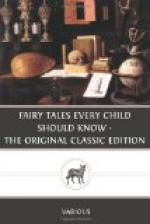determined, got out of the copper, and seized the
harp, The harp was enchanted by a fairy: it called
out loudly: “Master! master!” The
giant awoke, stood up, and tried to pursue Jack; but
he had drank so much, that he could hardly stand.
Poor Jack ran as fast as he could. In a little
time the giant recovered sufficiently to walk slowly,
or rather, to reel after him. Had he been sober,
he must have overtaken Jack instantly; but, as he
then was, Jack contrived to be first at the top of
the bean-stalk. The giant called after him in
a voice like thunder, and sometimes was very near
him. The moment Jack got down the bean-stalk he
called out for a hatchet; one was brought him directly;
just at that instant, the giant was beginning to descend;
but Jack, with his hatchet, cut the bean-stalk close
off at the root, which made the giant fall headlong
into the garden: the fall killed him, thereby
releasing the world from a barbarous enemy. Jack’s
mother was delighted when she saw the bean-stalk destroyed.
At this instant the fairy appeared: she first
addressed Jack’s mother and explained every
circumstance relating to the journeys up the bean-stalk.
The fairy charged Jack to be dutiful to his mother,
and to follow his father’s good example, which
was the only way to be happy. She then disappeared.
Jack heartily begged his mother’s pardon for
all the sorrow and affliction he had caused her, promising
most faithfully to be very dutiful and obedient to
her for the future.
CHAPTER XVIII
JACK THE GIANT KILLER
In the reign of the famous King Arthur, there lived
near the Land’s End of England, in the county
of Cornwall, a worthy farmer, who had an only son
named Jack. Jack was a boy of a bold temper; he
took pleasure in hearing or reading stories of wizards,
conjurers, giants, and fairies, and used to listen
eagerly while his father talked of the great deeds
of the brave knights of King Arthur’s Round
Table. When Jack was sent to take care of the
sheep and oxen in the fields, he used to amuse himself
with planning battles, sieges, and the means to conquer
or surprise a foe. He was above the common sports
of children; but hardly any one could equal him at
wrestling; or, if he met with a match for himself in
strength, his skill and address always made him the
victor. In those days there lived on St. Michael’s
Mount of Cornwall, which rises out of the sea at some
distance from the main land, a huge giant. He
was eighteen feet high, and three yards round; and
his fierce and savage looks were the terror of all
his neighbours. He dwelt in a gloomy cavern on
the very top of the mountain, and used to wade over
to the main land in search of his prey. When
he came near, the people left their houses; and after
he had glutted his appetite upon their cattle, he would
throw half-a-dozen oxen upon his back, and tie three
times as many sheep and hogs round his waist, and
so march back to his own abode. The giant had




